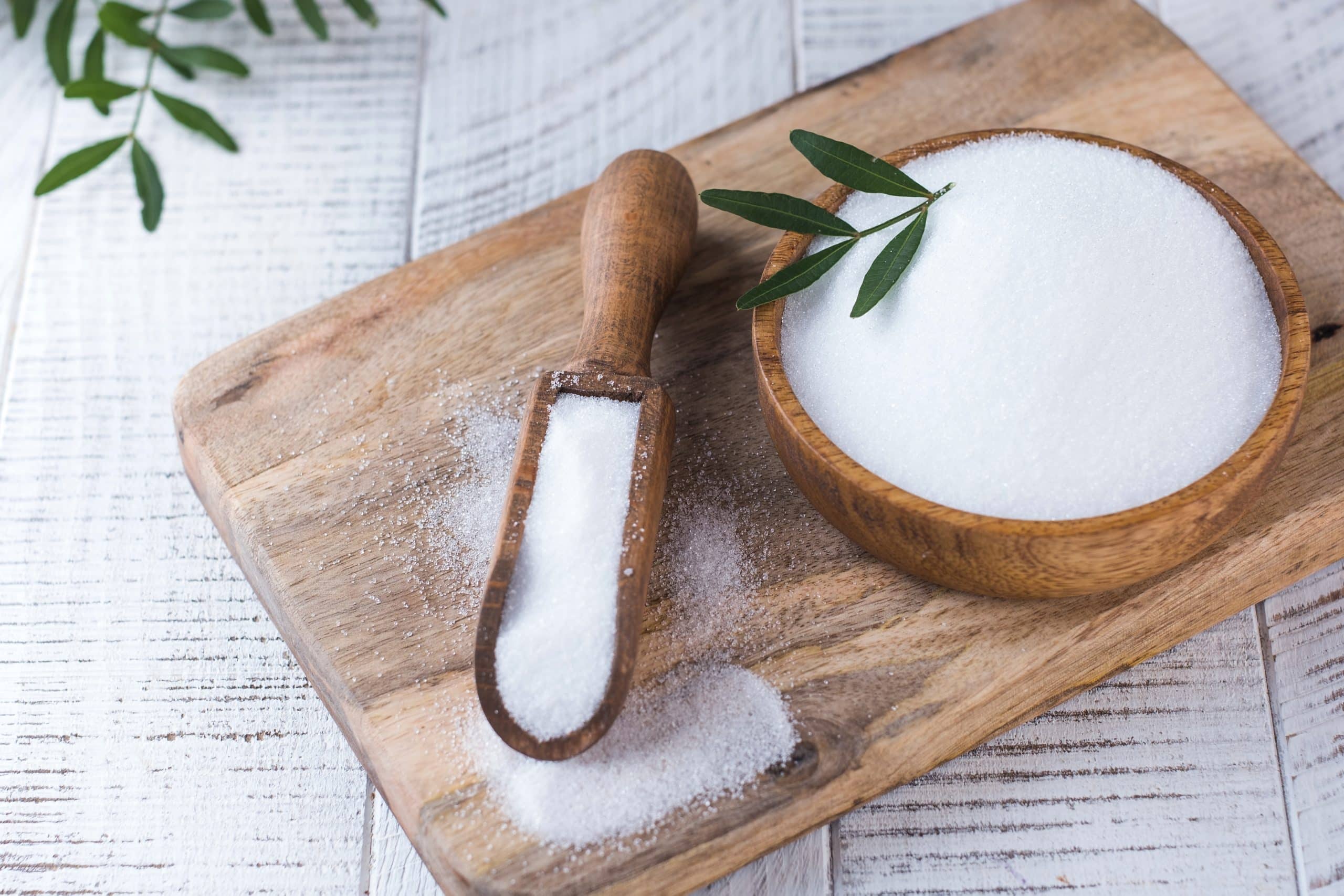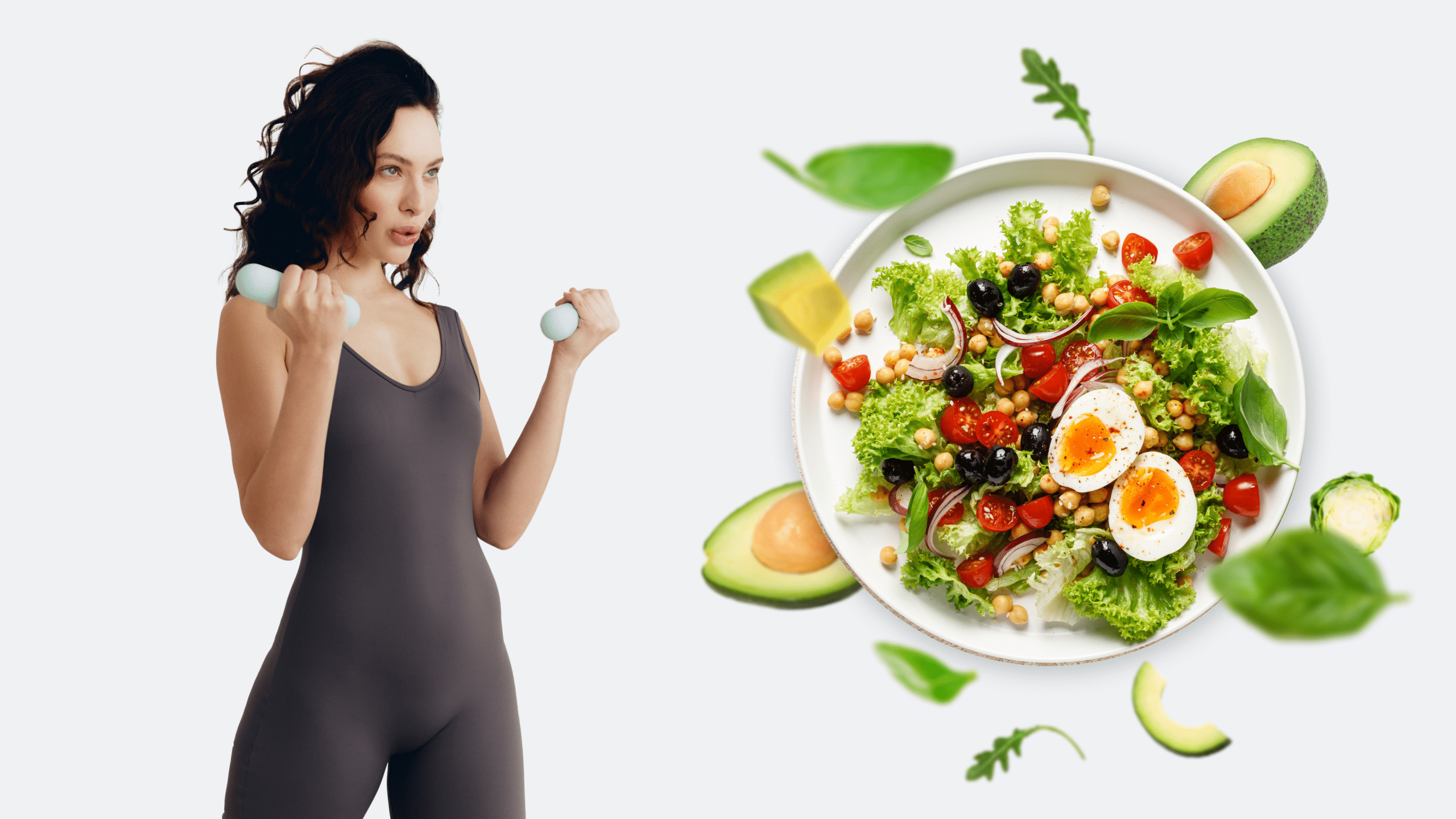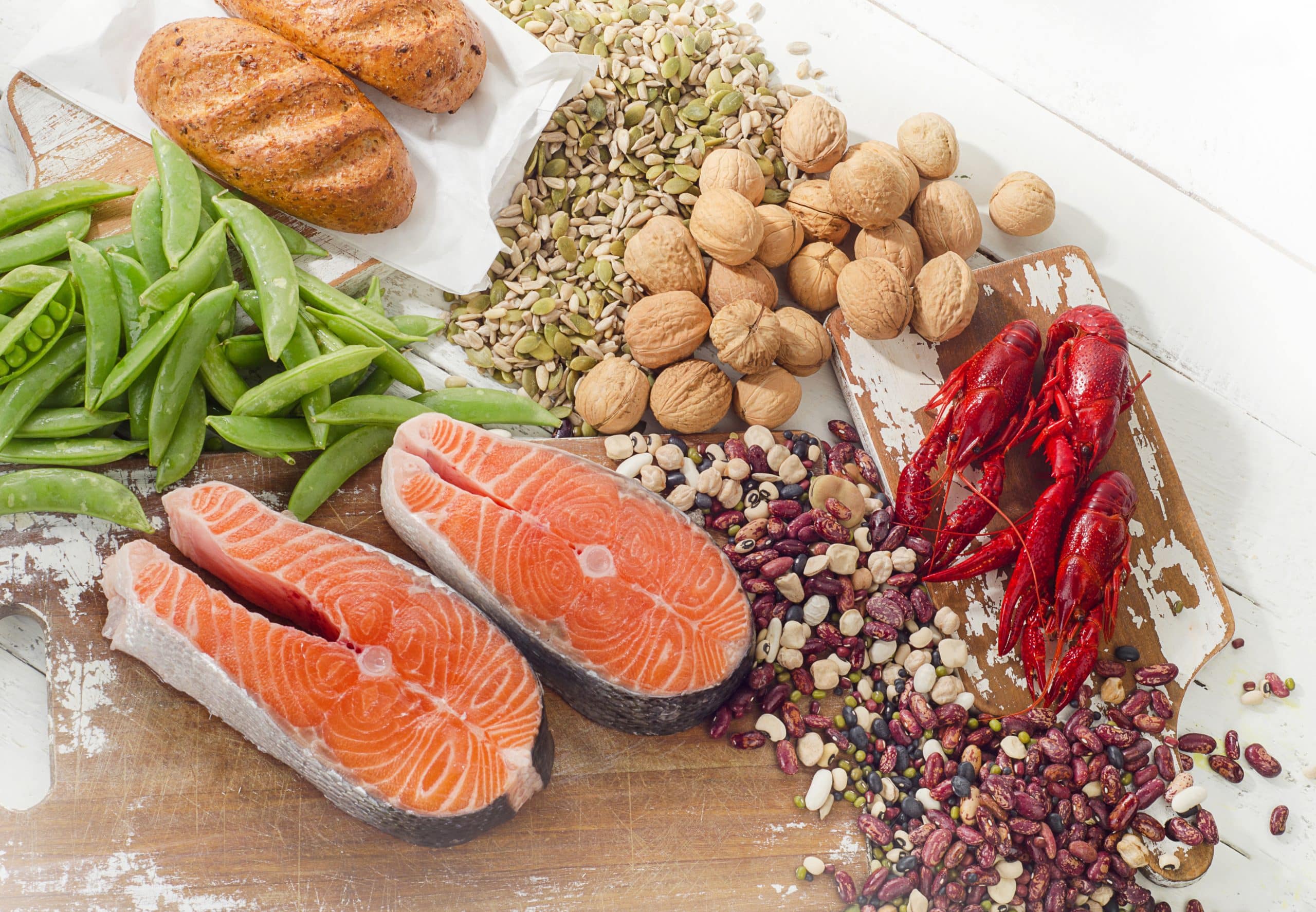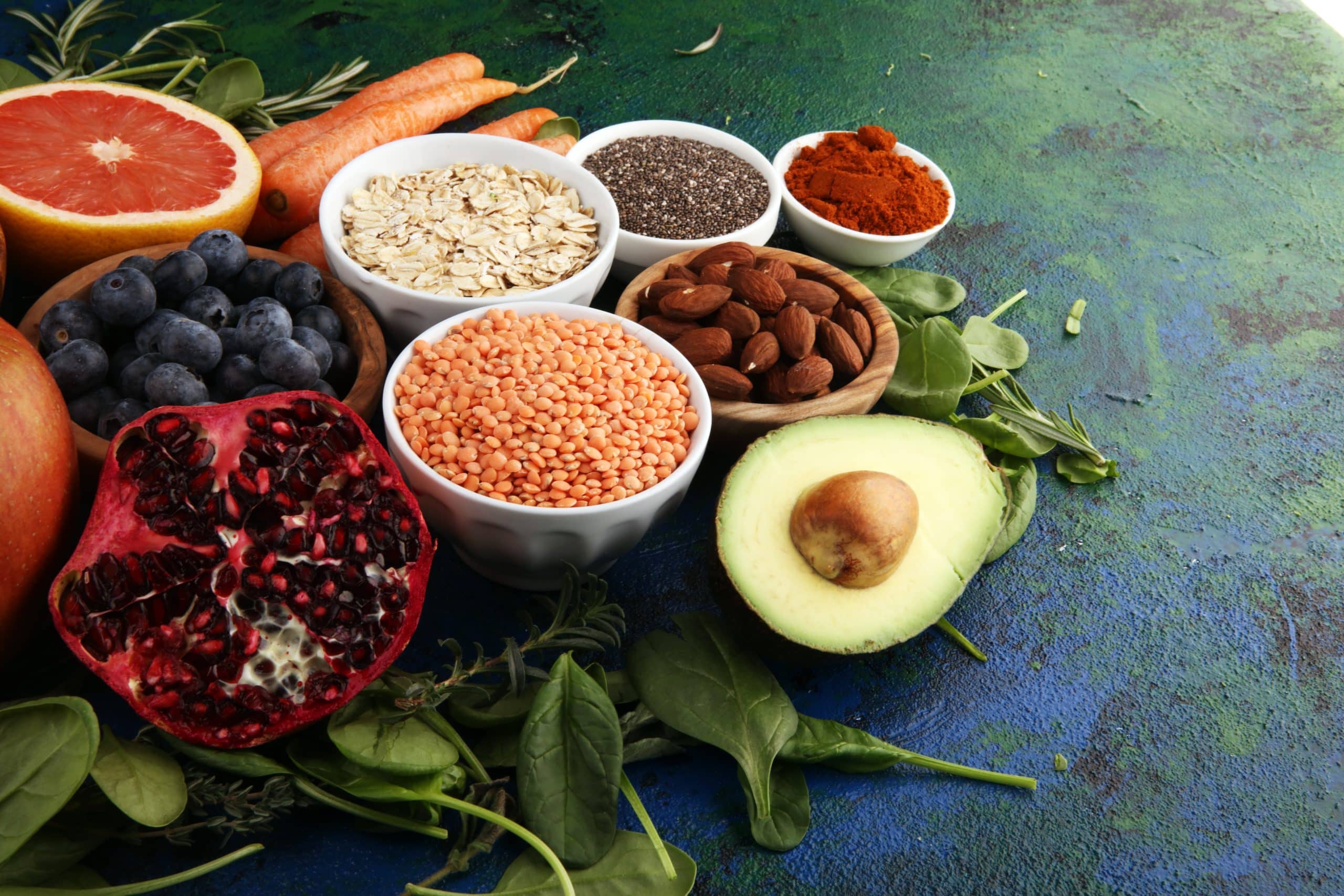Low-calorie sweeteners are a popular choice for those trying to manage their sugar intake, lose weight, or maintain a healthy lifestyle. Among these, Erythritol and Stevia stand out due to their natural origins and minimal impact on blood sugar levels.
Erythritol, a sugar alcohol extracted from certain fruits and fermented foods, is praised for its taste closely resembling that of regular sugar but with almost zero-calories.
Stevia derived from the leaves of the Stevia rebaudiana plant, is a potent sweetener with zero calories and can be up to 300 times sweeter than table sugar. While both hold their unique benefits, they also come with potential side effects.
This article will delve into the nutrients, health benefits, side effects, and more regarding Erythritol and Stevia, aiming to provide you with comprehensive knowledge to make an informed choice about these sweeteners.
What Is Erythritol: Nutrient Profile
Erythritol is a type of sugar alcohol, also known as a polyol, which naturally occurs in a variety of foods. It’s found in small amounts in fruits like pears, melons, and grapes, as well as in mushrooms and fermentation-derived foods like wine, soy sauce, and cheese (7).
In terms of nutrient content, erythritol stands out for its low-calorie profile. While most sugar alcohols are low in calories as compared to regular sugar, erythritol is almost non-caloric. It contains only about 0.24 calories per gram, which is significantly less than the 4 calories per gram of regular sugar.
Despite being a sugar alcohol, erythritol doesn’t affect blood sugar or insulin levels, making it safe for diabetics. This is because the body absorbs erythritol but doesn’t metabolize it into glucose. It’s quickly absorbed in the small intestine, enters the bloodstream, and then is excreted unchanged through urine (7).
Erythritol is approximately 70% as sweet as sucrose (table sugar). However, it doesn’t contribute to tooth decay as oral bacteria cannot metabolize it, unlike other types of sugars. Despite being a carbohydrate, erythritol doesn’t provide the same amount of energy as regular carbohydrates due to its unique metabolism.
BetterMe App helps you achieve your body goals with ease and efficiency by helping to choose proper meal plans and effective workouts. Start using our app and you will see good results in a short time.
What Is Stevia Nutrient Profile
Stevia is a natural sweetener derived from the leaves of the Stevia rebaudiana plant, native to Brazil and Paraguay. It’s known for its intense sweetness, which can be up to 250-300 times sweeter than table sugar (sucrose) (8).
The nutrient content of stevia is quite distinctive. Stevia contains negligible calories and carbohydrates, making it a virtually zero-calorie sweetener. This is due to the unique compounds in stevia called steviol glycosides — the most prevalent being Rebaudioside A and Stevioside — which provide its sweet taste without contributing substantive caloric energy to the diet (8).
Unlike many other sugar substitutes, stevia is not a sugar alcohol and does not affect blood sugar levels, which can make it suitable for people who need to manage their blood glucose.
In terms of texture and flavor, stevia is available in liquid, powder, and granulated forms, but it has a slightly different taste profile than sugar, with some people noting a mild, licorice-like aftertaste. The sweetness of stevia also lasts longer than that of sugar.
It’s important to note that some stevia products found on the market may include other ingredients. This means the nutrient content can vary depending on the specific product.

Which Tastes Better, Stevia or Erythritol?
The taste of Stevia and Erythritol can be subjective, as it can vary from person to person.
Erythritol is known for its clean, subtly sweet taste that closely resembles the taste of table sugar. It has a slight refreshing sensation and feels a lot like regular sugar on the tongue. This sugar alcohol is about 70% as sweet as sugar, which means it may not provide the same intensity of sweetness but offers a very similar flavor profile.
On the other hand, Stevia, which is derived from the leaves of the Stevia rebaudiana plant, is much sweeter than sugar. However, it has a more herbal and slightly bitter aftertaste, especially when used in large amounts. Some people might find this aftertaste off-putting, while others might not notice it or may even enjoy the unique flavor.
What Are The Pros and Cons of Erythritol?
Erythritol is a sugar alcohol that’s used as a low-calorie sweetener. Like all food ingredients, it has its advantages and disadvantages.
Pro: Low Caloric Content
Erythritol stands out for its extremely low caloric content. It contains only 0.24 calories per gram, which is significantly less than the 4 calories per gram you’d get from regular sugar.
This makes erythritol an attractive choice for those wanting to reduce their calorie intake without giving up sweetness in their diet. Because of its low caloric content, using erythritol can help individuals manage their weight by decreasing the total amount of calories consumed.
Pro: Doesn’t Spike Blood Sugar or Insulin Levels
Another benefit of erythritol is that it doesn’t raise blood sugar or insulin levels. This makes it a safe option for diabetics who need to manage their blood glucose levels.
Erythritol is absorbed into the bloodstream from the small intestine, but it isn’t metabolized by the body, so it doesn’t get converted to glucose or require insulin to be processed (6).
Pro: Does Not Contribute to Tooth Decay
Unlike regular sugar, erythritol does not contribute to tooth decay. Bacteria in the mouth cannot metabolize erythritol, so it doesn’t cause cavities or dental plaque. This makes erythritol a tooth-friendly alternative to sugar and a good choice for those concerned about oral health (5).
Con: Might Not Be as Sweet as Expected
While erythritol is a sweetener, it’s not as sweet as regular sugar. It’s approximately 70% as sweet as sucrose. For some, this might mean they end up using more erythritol to achieve the desired level of sweetness, which could potentially offset some of its low-calorie benefits, but the calorie content is so low that it still would not likely be significant.
Con: Digestive Issues
One potential downside of erythritol is that it can cause digestive issues in some people. Even though it’s generally well-tolerated, consuming large amounts could lead to bloating, gas, and diarrhea.
This is because erythritol, like other sugar alcohols, isn’t fully absorbed in the digestive tract and can draw water into the intestine or be fermented by gut bacteria, which may lead to digestive upset (1).
Con: Allergic Reactions
Though rare, some people may experience allergic reactions to erythritol (3) (10). Symptoms can include hives, rash, and itching, among others. While erythritol allergies are not common, individuals with a known sensitivity should avoid its use.
Read more: The Applesauce Recipe No-Sugar For When You Need A Sweet Treat.
What Are The Pros and Cons of Stevia?
Stevia is a natural sweetener derived from the leaves of the Stevia rebaudiana plant. As with any food ingredient, it has its own set of benefits and drawbacks.
Pro: Zero-Calorie Sweetener
One of the key advantages of stevia is that it’s a zero-calorie sweetener. This makes it an attractive option for people trying to reduce their calorie intake or manage their weight (9).
Despite having no calories, stevia is incredibly sweet, often considered to be up to 250-300 times sweeter than table sugar (8). This high-intensity sweetness means that only a small amount is needed to achieve the desired level of sweetness, which can help to control overall caloric intake.
Pro: Safe for Diabetics
Stevia is also safe for diabetics, as it does not raise blood sugar levels (4). This is because the body does not metabolize the sweet compounds in stevia, known as steviol glycosides, in the same way it metabolizes regular sugar. This means that stevia can provide sweetness without impacting blood glucose or insulin levels, making it a good choice for those managing diabetes or prediabetes.
Pro: Long Shelf Life
Stevia is stable at high temperatures and has a long shelf life, making it convenient to use in a variety of ways. It can be used in cooking and baking, and it doesn’t lose its sweetness over time. This makes stevia a versatile sweetener that can be easily incorporated into a wide range of dishes and drinks.
Con: Aftertaste
A commonly cited downside of stevia is its aftertaste. While the degree to which this is noticed can vary between individuals, some people report a slightly bitter or licorice-like aftertaste when using stevia.
This distinctive flavor profile can make it less suitable for certain recipes or beverages where a clean, sugar-like sweetness is desired. The aftertaste can also be off-putting to some people, reducing the likelihood of them choosing stevia as their preferred sweetener.
Con: Highly Processed Varieties
Many commercially available stevia products are highly processed and may include other ingredients such as erythritol or dextrose. This means that not all products labeled as ‘stevia’ will have the same nutrient profile.
Consumers should be aware of this and check the ingredient list to ensure they are getting pure stevia if that is what they are looking for.
Con: Possible Health Concerns
Despite its many benefits, there are some potential health concerns associated with stevia. Some research has raised concerns about potential allergic reactions to stevia, although these cases appear to be quite rare (2).
Dropping pounds by the dozens without putting yourself through the wringer is everyone’s weight loss pipe dream. But what if we told you that the BetterMe app can make that happen? Keep yourself in prime shape with our fat-blasting workouts, delicious budget-sparing recipes, and body-transforming challenges with our app!
So, Which Is Best – Erythritol or Stevia?
Both erythritol and stevia offer advantages over regular sugar, although each has its own unique pros and cons. Erythritol is low in calories and doesn’t cause blood sugar spikes, but it may cause digestive upset if consumed in large amounts.
Conversely, stevia is zero-calorie and safe for diabetics, but it may have an unpleasant aftertaste. Ultimately, the best choice will depend on individual preferences and needs.
For some people, a combination of both erythritol and stevia could be the ideal way to enjoy sweetness without compromising on health or taste.
Frequently Asked Questions
Why Use Erythritol Instead Of Stevia?
Erythritol may be a preferred choice over stevia for several reasons. It has about 70% of the sweetness of sugar, which makes it easier to substitute in recipes. Additionally, erythritol has a similar texture to sugar and doesn’t have the bitter aftertaste that some people experience with stevia.
Which Tastes Better Stevia Or Erythritol?
The taste preference between stevia and erythritol is largely subjective and can vary from person to person.
Some people prefer the taste of erythritol as it is closer to the taste of sugar and lacks the bitter aftertaste that can come with stevia. However, others might prefer stevia for its natural origin and intense sweetness.
Is There a Downside To Erythritol?
While erythritol is generally well-tolerated, it can cause digestive issues such as bloating, gas, and diarrhea in some people, especially when consumed in large amounts. Additionally, erythritol is less sweet than sugar, so more may be required to achieve the desired sweetness, which could potentially lead to overconsumption.
Is Stevia Safer Than Erythritol?
Both stevia and erythritol are generally considered safe for consumption by healthy individuals. They are both non-nutritive sweeteners that do not affect blood sugar levels, making them safe for diabetics. However, some people may experience digestive discomfort from erythritol or a bitter aftertaste from stevia. As with any dietary change, it’s always best to consult with a healthcare provider.
Is Erythritol Safe To Eat Everyday?
Erythritol is generally safe to consume daily in moderate amounts. However, consuming large amounts of erythritol may lead to digestive issues like bloating, gas, and diarrhea. As with any food or ingredient, balance and moderation are key.
Is Erythritol Keto Safe?
Yes, erythritol is considered keto-friendly. It contains almost zero calories and does not affect blood sugar or insulin levels, making it an ideal sweetener choice for those following a ketogenic diet.
Read more: No-Sugar Bread Recipes For Healthy, Guilt-Free Snacking.
The Bottom Line
Both erythritol and stevia offer advantages over regular sugar, as they are low-calorie sweeteners. Each of them has its own unique pros and cons. When deciding which is the most suitable, consider your diet, taste preference and the sweetener’s availability.
DISCLAIMER:
This article is intended for general informational purposes only and does not serve to address individual circumstances. It is not a substitute for professional advice or help and should not be relied on for making any kind of decision-making. Any action taken as a direct or indirect result of the information in this article is entirely at your own risk and is your sole responsibility.
BetterMe, its content staff, and its medical advisors accept no responsibility for inaccuracies, errors, misstatements, inconsistencies, or omissions and specifically disclaim any liability, loss or risk, personal, professional or otherwise, which may be incurred as a consequence, directly or indirectly, of the use and/or application of any content.
You should always seek the advice of your physician or other qualified health provider with any questions you may have regarding a medical condition or your specific situation. Never disregard professional medical advice or delay seeking it because of BetterMe content. If you suspect or think you may have a medical emergency, call your doctor.
SOURCES:
- A review of polyols – biotechnological production, food applications, regulation, labeling and health effects (2019, tandfonline.com)
- Are highly purified steviol glycoside sweeteners food allergens? (2015, sciencedirect.com) l
- Case of a 6-year-old boy with anaphylaxis induced by erythritol with positive skin prick test and negative basophil activation test (2022, biomedcentral.com)
- Effects of stevia on glycemic and lipid profile of type 2 diabetic patients: A randomized controlled trial (2020, ncbi.nlm.nih.gov)
- Erythritol alters microstructure and metabolomic profiles of biofilm composed of Streptococcus gordonii and Porphyromonas gingivalis (2013, onlinelibrary.wiley.com)
- Erythritol as sweetener—wherefrom and whereto? (2017, link.springer.com)
- Erythritol: An In-Depth Discussion of Its Potential to Be a Beneficial Dietary Component (2023, mdpi.com)
- Natural sweetener Stevia rebaudianFunctionalities, health benefits and potential risks (2021, ncbi.nlm.nih.gov)
- Stevia, Nature’s Zero-Calorie Sustainable Sweetener (2015, ncbi.nlm.nih.gov)
- The First Case of Erythritol-Induced Anaphylaxis in Korea (2022, ncbi.nlm.nih.gov)













